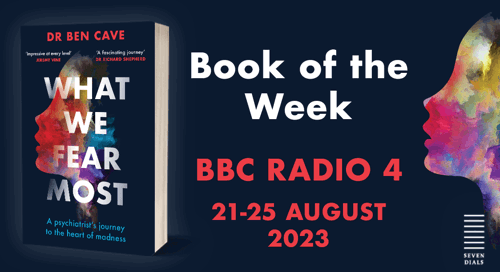Life as a forensic psychiatrist: Expert’s book about treating patients with some of the most challenging mental health conditions chosen as BBC’s Book of the Week
Date: 16th August 2023
Priory consultant Dr Humphrey Needham-Bennett’s autobiography about life in forensic psychiatry has been chosen by BBC Radio 4 as its Book of the Week.
Written under the pen name Dr Ben Cave, ‘What We Fear Most’ pre-dates his time at Priory, and is an account of a 25-year career in prisons and secure hospitals, treating acutely unwell patients with conditions ranging from schizophrenia, steroid abuse and personality disorders to psychosis.
Dr Needham-Bennett now works in general adult psychiatry as medical director of Priory’s Ticehurst House Hospital. We sat down with him to ask him about his book, which has received rave reviews, and life as a forensic psychiatrist responsible for protecting the public and the patient with severe mental illness.

What influences in your life, work or family most inform your views of mental health?
“I grew up with the pall of family-suicide hanging over us. I’ve an uncle who had a Learning Disability, another with undiagnosed Autistic Spectrum Disorder and a depressive mother. It’s all there in the book, and it all shaped me – how could it not? Then my cousin took his own life as an adult. I’ve seen the terrible outfall of this as I still do in the families of those affected by suicide. I know the intergenerational trauma of undiagnosed or untreated mental disorders all too well. I suppose I came into psychiatry because I felt at home there and I wanted to help people. It might sound trite, but it’s what matters.”
Why do you think there is so much interest in books about mental health? Is it related to the pandemic?
“I think we are endlessly fascinated by the human condition. We love to know why people act as they do – and in doing so, understand ourselves a little more. The pandemic has had a huge effect on people all over the world. I am seeing young men and women with anxiety, depression, OCD and even psychosis which I would ascribe to the social pressure and trauma of lockdown. It’ll be years before we see the full effect of Covid … on a whole generation of young people.”
How would you attract more people into psychiatry?
“For me, psychiatry was a vocation. For others, there is a pragmatism to the decision about which speciality to go into. We need to let people know how incredibly diverse psychiatry services are, from CAMHS to older age services, from psychoanalysis to cutting edge neurosciences. We need to be welcoming, inclusive and caring. We need to look after people in the profession, to stop burnout and focus on retention as much as recruitment (across the mental healthcare sector).”
Are there grounds for optimism in the treatment of mental health?
“Yes, definitely. And if you read the book, you’ll understand the deliberately mixed message. Whilst I am optimistic, I see families bewildered and confused about how to get help for their loved one. Community services are struggling – they’re generally understaffed, overworked and demoralised. And nationally, we’re operating with too few beds and a lack of aftercare. So, if you are in treatment, by and large, it will be good. But getting that treatment is difficult. We need to focus on funding, retention of staff, and genuine multi-disciplinary teams with psychology at the heart of every team.”
What’s the one thing you wished people knew about forensic psychiatry?
“You can’t treat a prisoner under the Mental Health Act while they are still in prison. Perhaps it’s time to reconsider this. There is so much mental illness in prisons, we’re never realistically going to get everyone treated in hospitals. We need medicine and therapy in our prisons.”
:: The book will be available on BBC Sounds, and is being serialised by BBC Radio 4 from Monday August 21, for five days. It is available from Amazon and as an audiobook, read by actor David Rintoul. Patients and places in the book have been heavily anonymised.
ENDS
Contact: [email protected]
About Priory and MEDIAN
Priory is the UK’s leading independent provider of mental health services. We treat more than 70 conditions, including depression, anxiety, addictions and eating disorders, as well as children’s mental health, across our nationwide network of sites. We also support autistic adults and adults with a learning disability, Prader-Willi Syndrome and brain injuries, as well as older people, within our specialist residential care and supported living facilities – helping as many people as possible to live their lives.
Priory is part of the MEDIAN Group, one of Europe’s leading providers of high quality mental health and rehabilitation services. The MEDIAN Group comprises 290 facilities with 5,000 beds caring for 28,000 people in the UK, 120 facilities with 20,000 beds caring for around 250,000 patients in Germany, and 15 facilities with 2,000 beds caring for 13,000 people in Spain, with more than 29,000 employees overall.